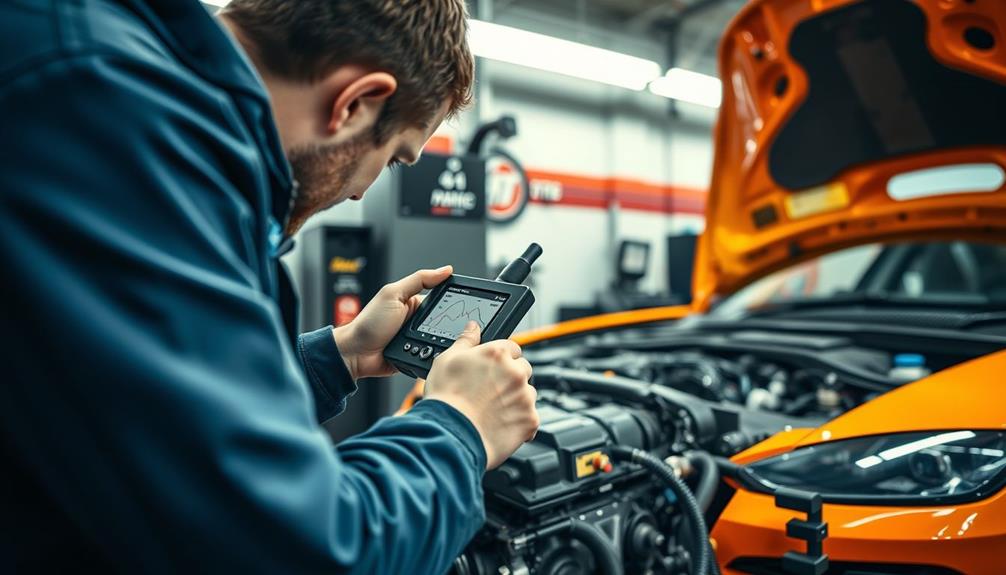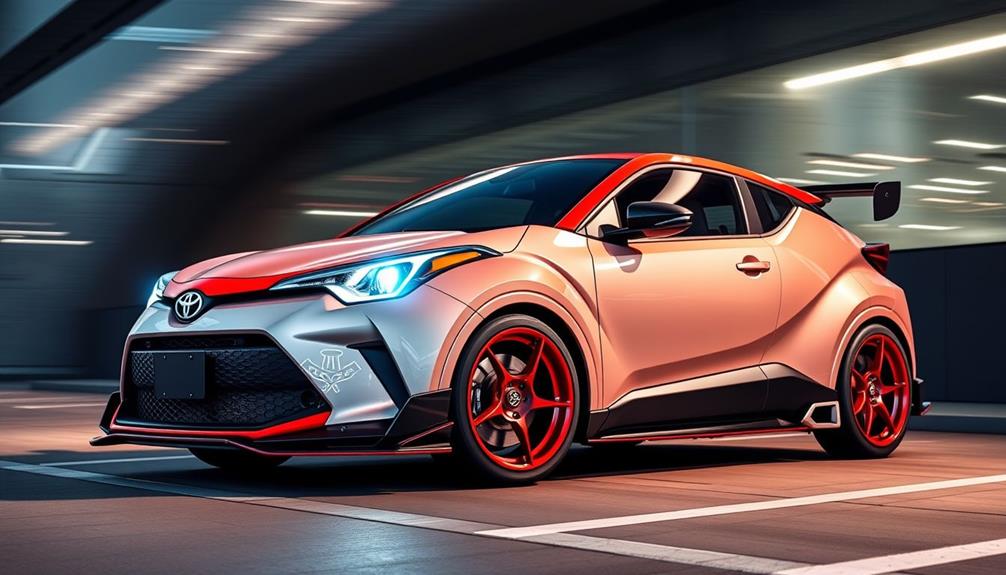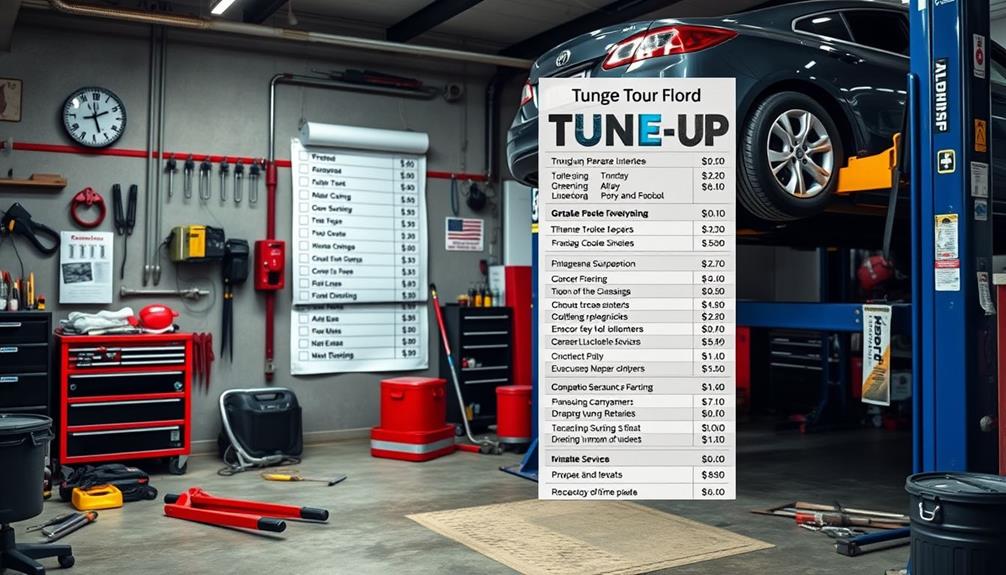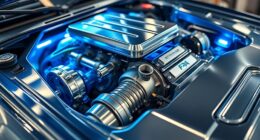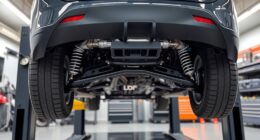Car tuning works by optimizing your vehicle's engine parameters to reveal hidden power and improve performance. You start by using an OBD-II scanner to diagnose issues and gather data. Next, select compatible tuning software to modify settings like fuel delivery and ignition timing. With a dynamometer, you measure power output before and after tuning. You'll also explore different tuning types, such as performance, suspension, or drivetrain tuning. While DIY tuning can be rewarding, it comes with risks, so knowing when to seek professional help can save you from costly mistakes. Stick around, and you'll uncover more about each step of the process. After selecting the tuning software, you will connect it to your vehicle’s OBD-II port and follow the instructions to make the necessary adjustments. It’s important to remember that not all car tuning software is created equal, so be sure to do your research and choose a reputable and compatible option for your specific vehicle make and model. Using the wrong or poorly designed car tuning software can lead to irreversible damage to your engine, so proceed with caution.
Key Takeaways
- Car tuning involves modifying engine parameters to optimize performance, enhancing speed, acceleration, and overall driving dynamics.
- Essential tools include an OBD-II scanner, tuning software, and a dynamometer for measuring power output.
- Choose compatible tuning software based on your vehicle's ECU, with options like EFI Live and HP Tuners.
- Types of tuning include performance, suspension, drivetrain, aesthetic, and engine tuning, each targeting different aspects of vehicle optimization.
- Professional tuners should be reputable and specialized, providing ongoing support and ensuring quality modifications without voiding warranties.
What Is Car Tuning?
Car tuning is all about optimizing your vehicle's performance beyond what it came with from the factory. When you tune your car, you're modifying the engine and its components to enhance efficiency, power, and your overall driving experience.
The primary goal of car tuning is to increase engine performance by fine-tuning aspects like fuel injection, ignition timing, and the air-fuel ratio.
You can typically expect power gains of 5-10% without making any hardware changes, although turbocharged vehicles often see even better results.
It's important to know that factory-tuned vehicles aren't fully maximized for performance. Manufacturers tend to prioritize cost efficiency, reliability, and the ability to adapt to various driving conditions, which means there's often untapped potential waiting for you.
Tuning allows you to customize how your car performs to match your personal preferences. Whether you want a sportier feel or better fuel efficiency, you can achieve it through careful adjustments.
Benefits of Tuning Your Car

Tuning your car can greatly enhance its performance metrics, giving you a boost in engine power and acceleration.
You'll not only enjoy a more responsive driving experience, but you can also optimize fuel efficiency, ensuring you get better mileage without sacrificing performance.
With the right tuning, your car can truly reflect your personal driving style and preferences.
Enhanced Performance Metrics
When you tune your vehicle, you're not just making adjustments; you're revealing a world of enhanced performance metrics that can transform your driving experience. By optimizing how your engine works, you can achieve power gains of 5-10% without any hardware changes. This not only boosts overall engine performance but also enhances responsiveness, making every drive more exhilarating.
A well-tuned car can improve acceleration and handling, allowing you to navigate corners and straightaways with confidence. You're tapping into the hidden power potential that factory settings often leave untapped, catering to your specific driving needs and preferences.
Whether you're on the track or cruising through city streets, these enhancements translate into lower quarter-mile times and higher top speeds, demonstrating tangible improvements.
When you take the time to tune your car, you're investing in a more dynamic driving experience. The benefits of enhanced performance metrics extend beyond just power; they create a more engaging connection between you and your vehicle, making every journey an adventure.
Improved Fuel Efficiency
By optimizing your vehicle's engine parameters, you can greatly improve fuel efficiency, making your drives not only more economical but also more enjoyable.
Car tuning fine-tunes the fuel injection and combustion processes, resulting in an improved air-fuel ratio (AFR). This can lead to a 5-10% boost in fuel economy without needing any hardware changes.
When you recalibrate the Electronic Control Unit (ECU), you can adjust fuel delivery and ignition timing. This minimizes excess fuel consumption while maximizing power output, enhancing your driving experience.
Turbocharged vehicles often respond particularly well to these tuning adjustments, allowing for more efficient combustion and additional fuel savings.
Incorporating engine modifications, like optimizing the exhaust system and upgrading air intakes, can further enhance airflow. This reduction in engine load contributes considerably to better fuel efficiency, allowing you to enjoy longer drives without the constant worry of refueling.
Ultimately, the goal of tuning is to reveal your engine's full potential while maintaining reliability.
With these improvements, you'll not only enjoy a more powerful ride but also a more economical one regarding fuel consumption.
The Car Tuning Process
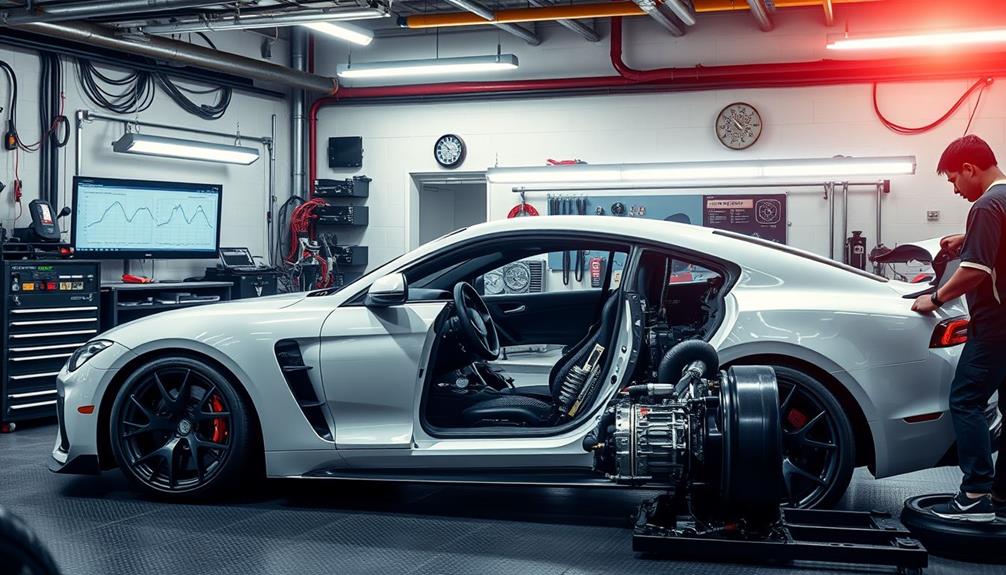
To start the car tuning process, you'll need to gather essential tools and select the right tuning software for your vehicle.
This step is vital, as the right equipment can greatly impact your tuning results.
Once you're set up, you can begin optimizing your car's performance effectively.
Essential Tools Required
Having the right tools is fundamental for successful car tuning. Start with an OBD-II scanner to diagnose issues and read sensor data, which helps you identify areas for improvement.
You'll also need a laptop equipped with tuning software to modify engine parameters effectively.
A dynamometer, or dyno, is important for measuring your vehicle's power output. It allows you to make precise adjustments under controlled conditions.
To enhance your fuel system, invest in a wideband oxygen sensor for monitoring the air-fuel ratio (AFR) in real time, ensuring ideal combustion during your tuning process.
Basic hand tools, like wrenches and screwdrivers, are necessary for installing or adjusting hardware components, such as intake systems and exhaust modifications.
Additionally, don't overlook the significance of a timing light. This tool enables you to check and adjust ignition timing, which is essential for maximizing engine performance without risking detonation.
With these fundamental tools at your disposal, you'll be well-equipped to tackle the tuning process and release your vehicle's full potential.
Tuning Software Selection
Once you've gathered your tools, the next step is selecting the right tuning software. This software is essential for adjusting your engine control unit (ECU), allowing you to modify fuel maps, ignition timing, and other vital performance parameters.
Choosing the right software means ensuring compatibility with your vehicle's ECU, as not all options support every brand or engine type.
Popular tuning software options include EFI Live, HP Tuners, and Cobb Tuning, each designed with unique features tailored to specific makes and models. Take time to compare these options and select one that fits your needs.
Many tuning software packages also offer real-time data logging capabilities. This feature lets you monitor engine performance as you make adjustments, helping you to make informed decisions during testing.
Familiarizing yourself with the software's interface and features is essential; it streamlines the tuning process and helps you avoid significant oversights.
Tools Needed for Tuning
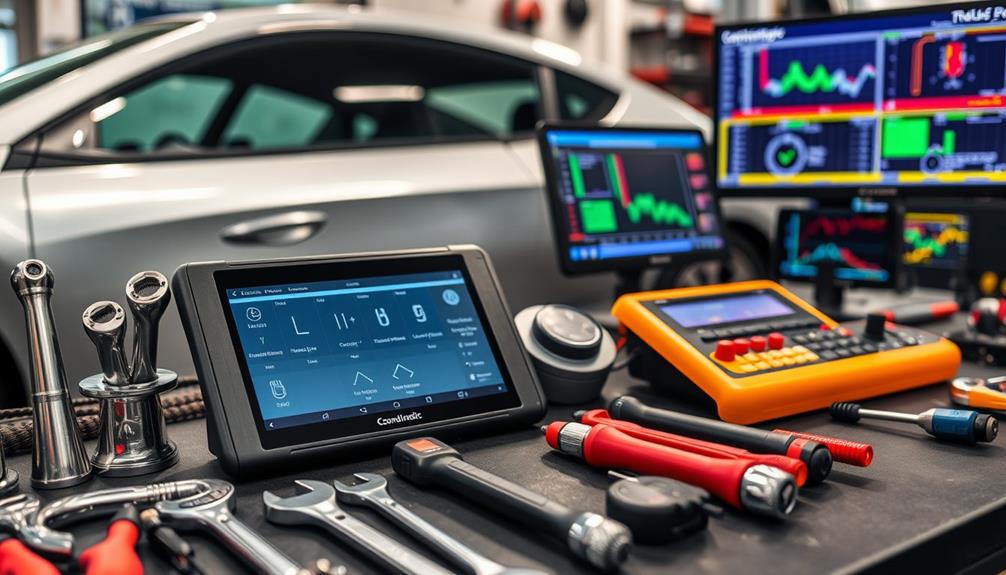
What tools do you need to tune your car effectively? First and foremost, a laptop equipped with tuning software is essential. This software allows you to make real-time adjustments to your car's performance settings.
An OBD-II scanner is another important tool—it helps you read diagnostic codes, ensuring you address any issues before tuning begins.
To accurately monitor your fuel mixture, a wideband air-fuel ratio (AFR) gauge is necessary. It provides critical data that can affect your tuning decisions.
Additionally, a timing light is important for checking and adjusting your ignition timing, which optimizes engine performance.
Don't forget about engine diagnostic tools like compression testers and vacuum gauges; they assess your engine's health and performance before you engage in tuning.
Using a dynamometer, or dyno, allows you to measure horsepower and torque, giving you precise feedback for real-time tuning adjustments.
Lastly, basic tools like wrenches and screwdrivers, along with specialized tuning kits, may be required for physical modifications to engine components.
With the right tools in hand, you're well on your way to revealing your car's full potential.
Types of Car Tuning
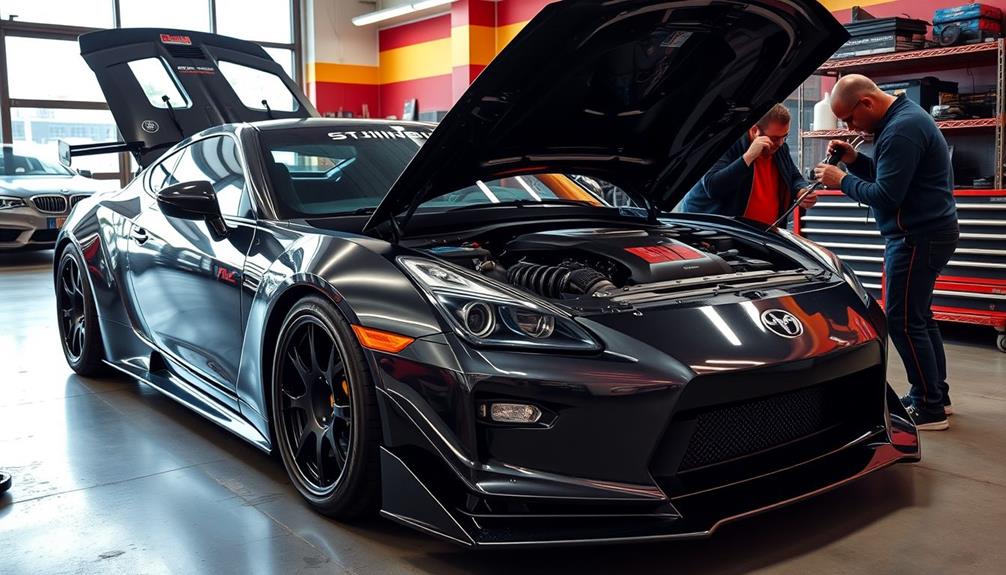
Car tuning offers a variety of approaches to enhance your vehicle's performance and appearance. Understanding these types can help you decide the best route for optimizing your car's capabilities.
- Performance Tuning: This focuses on improving speed and acceleration through modifications to engine components, ensuring your performance car stands out on the road.
- Suspension Tuning: By adjusting the suspension system with components like coilovers and sway bars, you can enhance handling and ride comfort, making every drive more enjoyable.
- Drivetrain Tuning: Targeting the transmission and driveline, this tuning optimizes power transfer and acceleration through upgrades like clutches and limited-slip differentials.
If you're looking for more than just performance, there's also Aesthetic Tuning. This involves visual modifications such as body kits and unique paint jobs that not only personalize your vehicle but can also improve aerodynamics.
Lastly, Engine Tuning is essential for maximizing efficiency and power output using techniques like ECU remapping and turbocharging.
Each type of tuning has its benefits, and exploring them will help you make informed decisions to truly optimize a car's performance.
Power Gains From Tuning
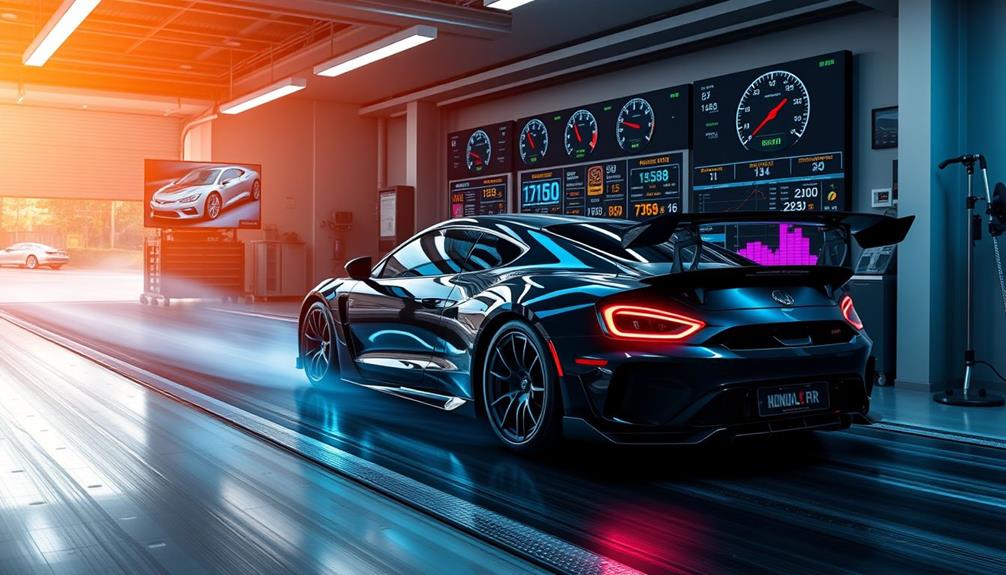
Tuning your vehicle can lead to impressive power gains, often ranging from 5-10% without any hardware changes. These gains depend on your car's make and model, and turbocharged vehicles typically respond better, offering more significant power increases.
In contrast, naturally aspirated cars might need additional upgrades to achieve similar results. It's essential to research your specific vehicle to accurately estimate potential power gains from tuning. Some factory tunes, especially in less performance-oriented models, may not yield any additional power, highlighting the untapped performance enhancements available through tuning.
During the tuning process, continuous adjustments and testing are vital. Small changes in parameters like air-fuel ratio and ignition timing can lead to noticeable improvements in power output. By fine-tuning these elements, you can access your vehicle's true potential and enjoy a more exhilarating driving experience.
Ultimately, understanding how your car's systems work together allows you to maximize the benefits of tuning. With the right approach, you can transform your vehicle into a more powerful and responsive machine, enhancing both performance and enjoyment on the road.
Risks of DIY Tuning
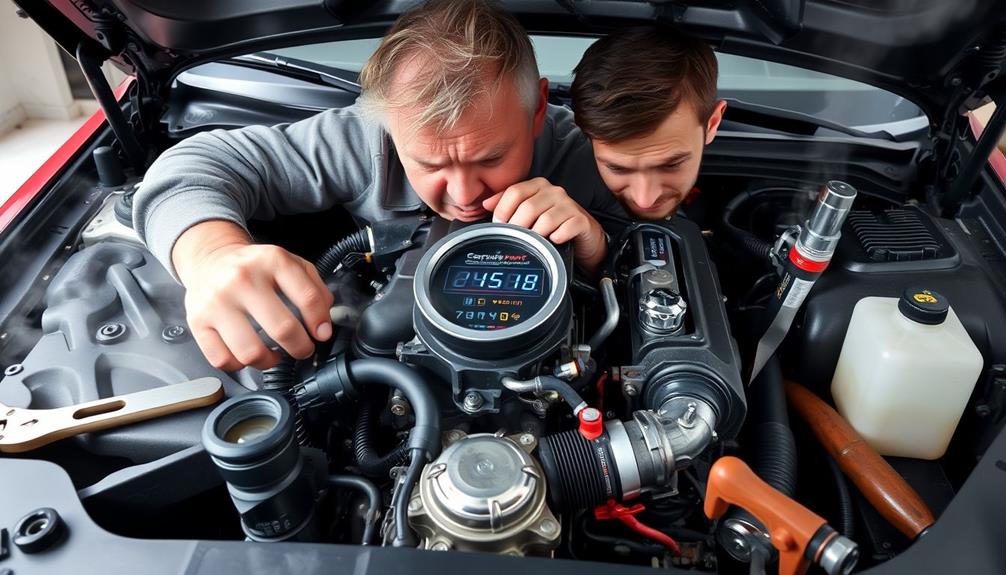
When you tackle DIY tuning, lack of expertise can lead to serious issues, including costly mistakes that might outweigh any savings.
You might also unknowingly void your vehicle's warranty, leaving you vulnerable to expensive repairs down the line.
It's essential to weigh these risks against the potential benefits before you start adjusting your car's performance.
Lack of Expertise
Attempting DIY tuning without the necessary expertise can lead to serious complications for your vehicle. A lack of expertise can result in adjustments that might seem minor but can cause significant issues down the line. For example, incorrect air-fuel ratios or ignition timing can lead to engine damage, affecting performance and potentially resulting in costly repairs.
Consider these points before diving into DIY tuning:
- You might overlook essential tuning parameters that impact overall vehicle performance.
- Using subpar parts and tools can compromise the effectiveness and reliability of your efforts.
- Mistakes in tuning can create safety risks, putting you and others on the road in jeopardy.
While DIY tuning can seem like a cost-effective option, the risks associated with a lack of understanding can far outweigh any initial savings.
Investing time to learn or seeking guidance from experienced professionals can help you avoid headaches and guarantee your car runs smoothly.
Potential Costly Mistakes
Diving into DIY car tuning without the necessary expertise can lead to a series of costly mistakes that may compromise your vehicle's performance and safety. One of the most significant risks you face is making improper tuning adjustments. Incorrect air-fuel ratios or ignition timing can result in engine damage, which could mean expensive repairs down the line.
Additionally, a lack of proper financial planning, such as having an adequate savings goals strategy, can exacerbate the financial strain caused by tuning mistakes.
Furthermore, if you lack professional guidance, you're at risk of voiding factory warranties. This can make future repairs or claims difficult and costly, leaving you in a tight spot when issues arise. You might think you're saving money by tuning your car yourself, but inadequate tools or equipment can lead to miscalculations and suboptimal performance.
Eventually, this might force you to seek professional help anyway, negating any initial savings.
Lastly, poorly executed modifications could also lower your vehicle's resale value. Potential buyers are often wary of cars with questionable tuning histories, making it harder to sell your vehicle later.
In short, consider the potential costly mistakes you could make before diving headfirst into DIY tuning.
Warranty Void Risks
Engaging in DIY car tuning can greatly jeopardize your factory warranty, with many manufacturers clearly stating that unauthorized modifications may lead to denied warranty claims.
If you're considering tuning, be aware that certain modifications like ECU remapping or changing exhaust systems are often flagged as warranty-voiding actions. This means if your vehicle experiences a failure linked to your DIY tuning, the manufacturer may refuse to cover repairs under the warranty.
Before you plunge into any tuning, it's essential to check your warranty's specific terms to understand which modifications might be permissible.
Here are some risks to keep in mind:
- Potential coverage gaps: Aftermarket tuners may offer their own warranties, but these often don't cover the same aspects as your original manufacturer's warranty.
- Financial implications: If a tuning change causes a mechanical issue, you could face significant repair costs out of pocket.
- Future resale value: A warranty void can deter potential buyers if you decide to sell your car later.
Ultimately, weigh the risks of warranty void against the performance gains you hope to achieve with DIY tuning.
Choosing a Professional Tuner
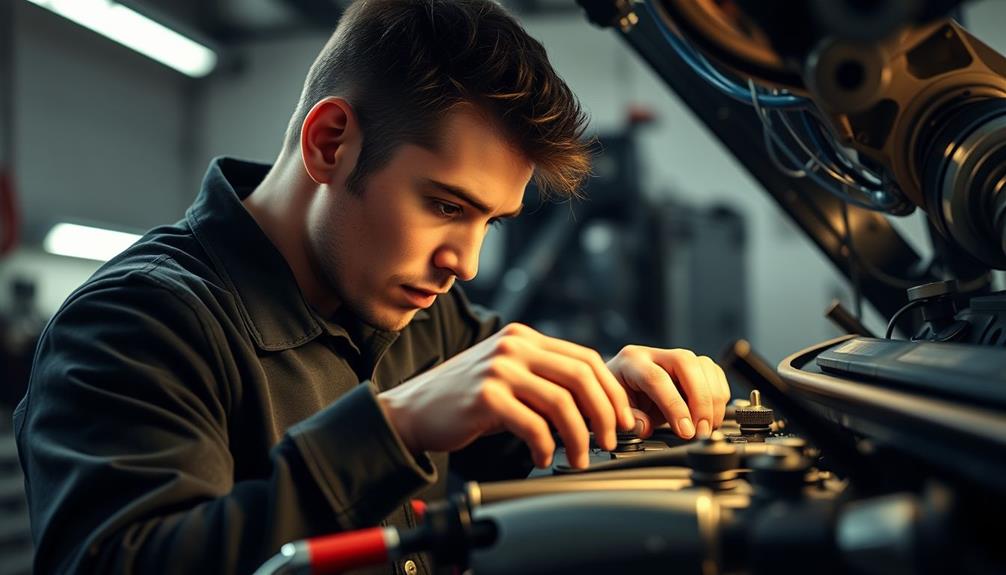
When you're ready to enhance your vehicle's performance, choosing a professional tuner is essential for achieving the best results. Tuning requires expertise specific to your vehicle's make and model, so selecting a tuner with a solid reputation is vital. Start by researching tuners, paying attention to their experience and customer reviews tailored to your vehicle.
Here's a quick guide to help you evaluate potential tuners:
| Criteria | What to Look For | Example Brands |
|---|---|---|
| Reputation | Solid reviews and experience | AC Schnitzer (BMW) |
| Certifications | Certified and compliant tuners | Brabus (Mercedes-Benz) |
| Warranty Protection | Coverage for modifications | Various providers |
| Ongoing Support | Transparency and assistance | Local tuning shops |
| Specialization | Expertise in your specific vehicle | Performance brands |
Understanding Factory Limitations
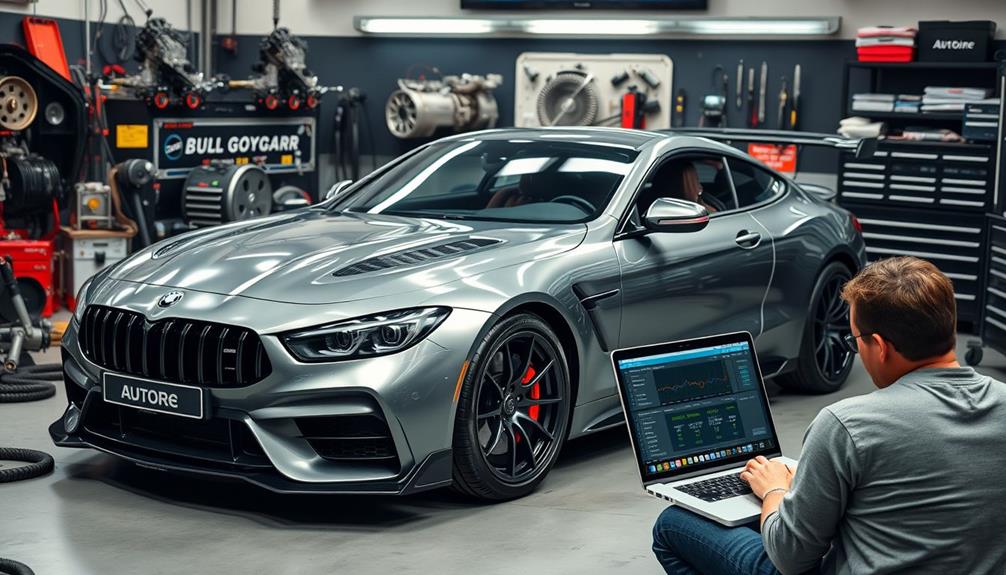
Have you ever wondered why your car doesn't perform as well as it could? The answer often lies in factory limitations.
Factory tuning typically prioritizes cost efficiency and reliability over maximizing performance capabilities. This means your vehicle mightn't be harnessing its full power potential.
Here are a few reasons why that happens:
- Conservative Power Output: Manufacturers set parameters to meet regulatory standards, leaving power potential untapped.
- Diverse Climate Considerations: Production models are designed to run well in various environments and fuel qualities, which can limit their performance.
- Shared Components: Many vehicles use the same engine components, leading to variations that aftermarket tuning can optimize.
Community Resources for Tuning
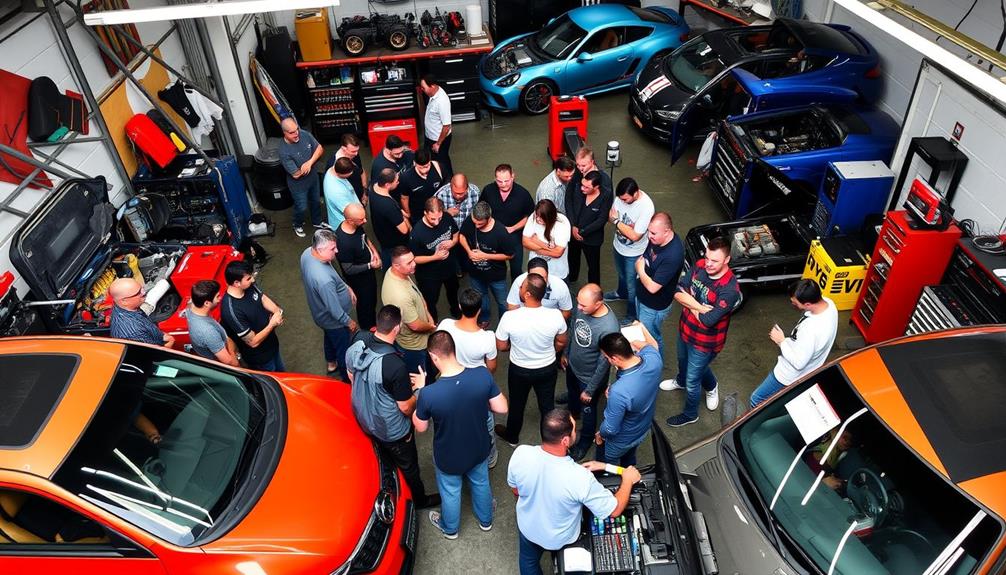
Many enthusiasts find that tapping into community resources can greatly enhance their car tuning experience. One of the best platforms you can explore is the High Performance Academy (HPA). They offer online courses like EFI Tuning Fundamentals and Practical Standalone Tuning, tailored for both beginners and experts.
With over 30,000 individuals learning the principles of car tuning through HPA, you'll be in good company. The community feature on HPA allows you to showcase your vehicle in a personal garage, promoting engagement and sharing insights with fellow enthusiasts.
You can also benefit from their structured learning process, ensuring you won't miss critical elements that could impact your tuning outcomes. Plus, if you're new to HPA, you can take advantage of a $50 discount on your first course—no coupon needed!
Their referral program offers additional discounts for friends who join, making it a great way to learn together. With quick response times for inquiries, typically within 12 hours, you'll receive timely support throughout your tuning journey.
Engaging with these community resources can make your car tuning experience not only educational but also enjoyable.
Frequently Asked Questions
What Are the Stages of Car Tuning?
Car tuning involves several stages: initial assessment of performance, ECU tuning for optimization, mechanical modifications with performance parts, dyno testing for precise adjustments, and fine-tuning based on real-world driving conditions to enhance overall performance.
What Is the Process of Tuning a Car?
"Measure twice, cut once." To tune your car, you'll gather tools, select software, connect a laptop, and adjust engine parameters. Continuous testing and tweaks are essential for achieving the best performance gains tailored to your vehicle.
How to Tune a Car for More Power?
To tune your car for more power, you'll need to adjust the air-fuel ratio and ignition timing. Use a dyno to fine-tune settings, inspecting components like fuel injectors regularly for peak performance gains.
What Is a Stage 4 Tune?
A Stage 4 tune can boost your car's power by over 30%. It involves extensive modifications like upgraded turbochargers and enhanced fuel systems, requiring a skilled professional to guarantee safe, efficient performance under increased demands.
Conclusion
In the world of car tuning, you're like a sculptor, chiseling away to reveal the masterpiece within your ride. By understanding the tuning process and knowing when to seek professional help, you can release your car's true potential while enjoying the journey. Remember, every adjustment is a step toward your ultimate driving experience. So, rev up your passion, and don't hesitate to explore the vibrant community that's enthusiastic to share tips and tricks along the way!
